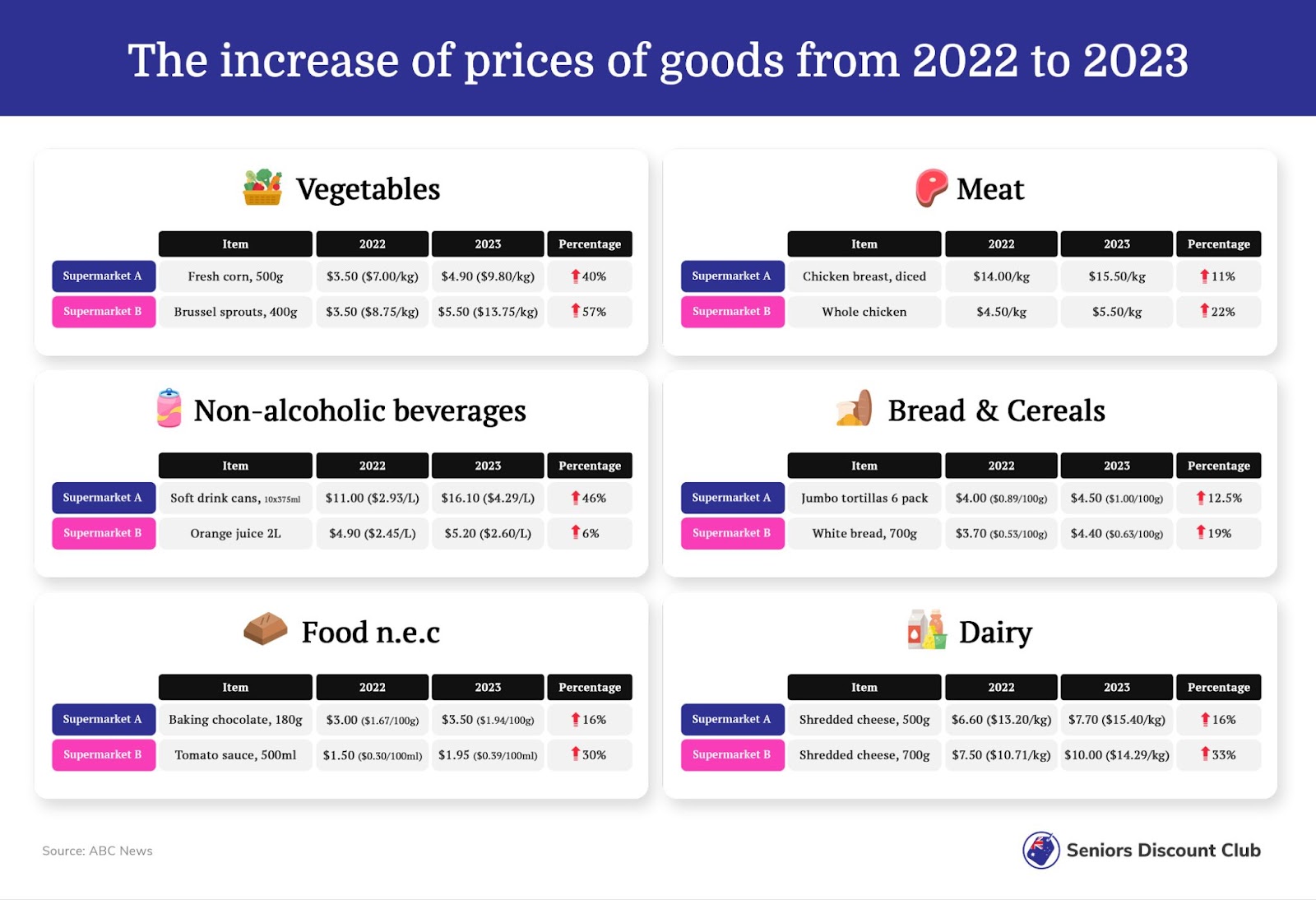You won't believe how much more you're spending nowadays! See how the 7.5% food price surge affects your check-out bill
By
VanessaC
- Replies 23
If you've been wincing at the thought of going to the supermarket lately, you're not alone. No matter what food or ingredients we buy, prices have been constantly rising over the last 12 months.
According to the latest figures from the Australian Bureau of Statistics (ABS), annual food inflation 2023 is currently sitting at a shocking 7.5 per cent–and it could get worse!
This price surge has been largely fueled by dairy prices climbing to 15.2 per cent in the last 12 months and bread and cereal prices climbing to 11.2 per cent. Even meals out and takeaway foods have skyrocketed, with prices up to 25 per cent for some items.

So what exactly does this mean for our grocery bills? The data below will show you how these percentage points translate to the prices of goods impacted in the last 12 months at Coles and Woolworths.

In the past year, prices of grocery staples such as meat rose 11 per cent at Supermarket A and 22 per cent at Supermarket B, while vegetable prices increased 40 per cent at Supermarket A and 57 per cent at Supermarket B.
Last year, you could purchase a Zinger burger combo at KFC for just $8.95–but now, you'll have to pay an extra $2 for the same item. That’s a 22 per cent surge in just a year! On the other hand, $1 frozen drinks at outlets like Hungry Jacks and Mcdonald's doubled in price and now cost $2 for a large-sized drink.
Unfortunately, a radical price drop in groceries in 2024 is unlikely. Despite inflation cooling down for food overall, this doesn't necessarily mean food is getting cheaper–it's just getting more expensive, more slowly.
Furthermore, the UBS Evidence Lab Grocery Study forecasts food inflation to ease in the coming months. Still, it may remain elevated due to issues on the supply chain, such as labour, domestic freight, and more.
It's alarming that prices are climbing so quickly, rest assured, we’re always looking for ways to help our dear members stretch their finances further. You can check out this forum for the latest deals, discounts, and bargains available or this forum for our latest money-saving tips and tricks!
Below are some tips on saving money at the supermarket:
Knowing a few smart shopping strategies that could save you some dollars at the checkout is crucial. The money saved can add up big time over a year!
For starters, make a shopping list and stick to it. Planning meals and snacks for the week can stop those mindless purchases and keep you on budget. Avoid shopping when you're hungry–as the adage goes, ‘Never shop on an empty stomach.’
Consider buying store-brand products. Australian supermarkets have significantly increased the number of their home-brand products. Some items–such as breakfast cereals and canned goods–are 30% cheaper when you opt for the supermarket's home brand.
Check out Woolworths’ very own Corn Flakes, whose price has dropped to $3 compared to its Kellogg’s counterpart, that’s currently at $5.
Another crafty savings tip is to buy in bulk or at reduced prices. Bulk buying of non-perishable items can lead to significant savings in the long run.
Finally, try online shopping. Coles and Woolworths often offer promotions on their apps or websites that aren't available in physical stores. Shopping online also lets you see your total before checking out, helping you stay within your budget.

Let us know your thoughts on the recent inflation of the prices of goods in the comments section below!
According to the latest figures from the Australian Bureau of Statistics (ABS), annual food inflation 2023 is currently sitting at a shocking 7.5 per cent–and it could get worse!
This price surge has been largely fueled by dairy prices climbing to 15.2 per cent in the last 12 months and bread and cereal prices climbing to 11.2 per cent. Even meals out and takeaway foods have skyrocketed, with prices up to 25 per cent for some items.

Prices of goods have been constantly rising over the last 12 months. Image source: Karolina Grabowska on Pexels.
So what exactly does this mean for our grocery bills? The data below will show you how these percentage points translate to the prices of goods impacted in the last 12 months at Coles and Woolworths.
Last year, you could purchase a Zinger burger combo at KFC for just $8.95–but now, you'll have to pay an extra $2 for the same item. That’s a 22 per cent surge in just a year! On the other hand, $1 frozen drinks at outlets like Hungry Jacks and Mcdonald's doubled in price and now cost $2 for a large-sized drink.
Unfortunately, a radical price drop in groceries in 2024 is unlikely. Despite inflation cooling down for food overall, this doesn't necessarily mean food is getting cheaper–it's just getting more expensive, more slowly.
Furthermore, the UBS Evidence Lab Grocery Study forecasts food inflation to ease in the coming months. Still, it may remain elevated due to issues on the supply chain, such as labour, domestic freight, and more.
It's alarming that prices are climbing so quickly, rest assured, we’re always looking for ways to help our dear members stretch their finances further. You can check out this forum for the latest deals, discounts, and bargains available or this forum for our latest money-saving tips and tricks!
Below are some tips on saving money at the supermarket:
Knowing a few smart shopping strategies that could save you some dollars at the checkout is crucial. The money saved can add up big time over a year!
For starters, make a shopping list and stick to it. Planning meals and snacks for the week can stop those mindless purchases and keep you on budget. Avoid shopping when you're hungry–as the adage goes, ‘Never shop on an empty stomach.’
Consider buying store-brand products. Australian supermarkets have significantly increased the number of their home-brand products. Some items–such as breakfast cereals and canned goods–are 30% cheaper when you opt for the supermarket's home brand.
Check out Woolworths’ very own Corn Flakes, whose price has dropped to $3 compared to its Kellogg’s counterpart, that’s currently at $5.
Another crafty savings tip is to buy in bulk or at reduced prices. Bulk buying of non-perishable items can lead to significant savings in the long run.
Finally, try online shopping. Coles and Woolworths often offer promotions on their apps or websites that aren't available in physical stores. Shopping online also lets you see your total before checking out, helping you stay within your budget.
Key Takeaways
- Food prices have seen a steep increase in the past year, with annual food inflation currently at 7.5 per cent, according to the ABS.
- Dairy products led the price rise by 15.2 per cent over the past 12 months, followed by breads and cereals, which rose by 11.2 per cent.
- Prices have also increased for meals out and takeaway foods.
- It is predicted that food will continue to get more expensive, at a slower rate, in 2024.
Let us know your thoughts on the recent inflation of the prices of goods in the comments section below!
Last edited by a moderator:







